Stuart Jaffe's Blog, page 10
April 24, 2012
Survival Story? Think Tom Hanks
I’ve written a lot about influences on various aspects of The Malja Chronicles, but now that I have some other material out there, I finally can branch out and discuss other cool things. After The Crash is a science-fiction survival tale about a tourist pilot coerced into smuggling a couple of aliens and a human scientist onto an untouched planet. As the title implies, something goes wrong, they crash, and now they have to survive.
I did a lot of research for this novel both in the biology/geology for the world-building as well as in 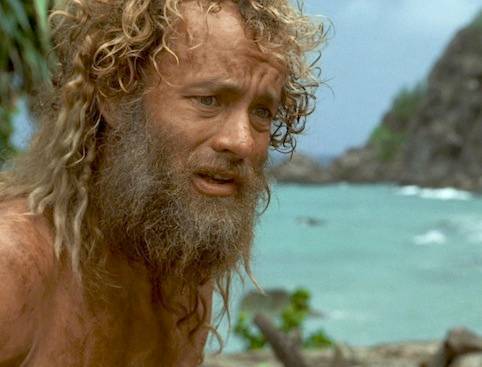 survival skills for the story. Fascinating stuff that I’ll be sure to discuss down the road. Today, however, I’m going to talk about a movie that I found very influential and inspiring for this book — Cast Away.
survival skills for the story. Fascinating stuff that I’ll be sure to discuss down the road. Today, however, I’m going to talk about a movie that I found very influential and inspiring for this book — Cast Away.
Cast Away is a film starring Tom Hanks and directed by Robert Zemeckis about a man who survives a plane crash only to spend the next four years of his life on a deserted island. It’s a fantastic film on many levels but two key elements in particular helped my story along.
The first is a bit of structural work. In Cast Away, the first half of the film is spent detailing Hanks’s current world — busy work, family life, various things that surround him with the life, noise, food, and everything that makes up our modern world. In other words, all the things the story is going to take away from him when he’s on that island. This was perfect for my purposes, so I did what any admiring creator does. I stole it.
Sort of.
I actually start After The Crash with a glimpse of Fiona Quinn, my tourist pilot, far in her future, so the reader has a sense of what she will become. Then we zip back to before the crash and spend a bit of time establishing the world she will lose. Like Cast Away, I don’t shy from taking my time here. The more detailed Fiona’s reality is, the greater her loss will be. When we finally get to the crash and its aftermath, if I’ve done my job well, the reader will have that same sense of strangeness that Tom Hanks portrays so well in his film.
The other aspect of Cast Away that had an influence on my book was more on the character level. In the movie, Hanks makes it back to civilization and is struck (once again) by the strangeness of this different world — only now it’s in reverse with the modern world being the strange one and his island life being the accepted reality. He then has to figure out how to live. Fiona has it a bit harder. She spends far longer alone than Hanks’s four years, and as a result, the question of whether to return to civilization or not weighs far greater.
Of course, she goes through a lot more than Hanks did. She’s on a planet filled with wildlife and danger — not to mention two alien creatures and human scientist, each with their own agendas. And she’s determined to uncover the mystery of why she was brought into this mess in the first place. I’ll simply say that things are not as simple as they appear.
April 17, 2012
Women Kickin Butt — Buffy
It’s about time I address this lady of lethality. To say that Buffy kicks butt is an understatement of epic proportions. Truly. Not just because Joss Whedon created a character (and a series) so powerful that even if you are not a fan, even if you’ve never seen an episode or read the comic or 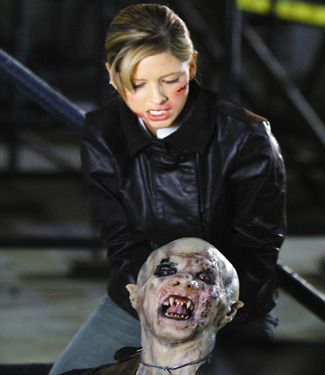 knew there was a movie originally, you still know of Buffy and that she is a vampire slayer. Buffy is a cultural icon, and one of the precursors to the current Urban Fantasy craze.
knew there was a movie originally, you still know of Buffy and that she is a vampire slayer. Buffy is a cultural icon, and one of the precursors to the current Urban Fantasy craze.
I won’t bore you with a rehash of what the show is about. You probably already know (and if you don’t, there are plenty of references). What I want to point out is that she, in fact, was not a simple vamp-slayer nor was she some grrrrl power wannabe. She was actually, and quite simply, a superhero. All the characteristics of a comic book superhero are within her. She is super-human in her physical abilities, she has side-kicks, she saves the world (many times), and she is always right.
That last point is an amazingly overt yet strangely subtle one. Overt because it happens almost every episode. Something is threatening lives or friends or whatever and Buffy says what should be done, but the rest of the Scoobies ignore, dismiss, or doubt her. They try some other method, fail, and rely on Buffy to save the day. Which she does, because she loves her friends — they are her family — and because she’s a superhero. Superheroes help those in need, even when it hurts.
But the whole “being right” thing is quite subtle, too. Never does she point out that she was right, and often she doubts herself enough to not realize she is right. And never do the Scoobies pick up on their pattern of behavior at a conscious level (though they all act as if on some deeper level, they always expect her to be right and to swoop in to save the day).
I could talk about Buffy for a long time, but really, it’s probably all been said. I suppose I just want to thank Joss Whedon for creating Buffy and sharing her with the world. There’s no doubt in my mind that the current crop of kickin’ butt women we see in books and film and TV owe a lot to her. Even my own dear creation, Malja, must acknowledge that Buffy provided a new scope to the female superhero, one that will reach further into our culture than any of us realize.
April 10, 2012
After The Crash Released and The Influence of Research
The ebook of After The Crash is out (a whole week early), and I couldn't be happier with how it turned out. For those who want it, the print version should be out in a few weeks. This one required a lot of research which is what I want to talk about today. Don't worry. I'm not about to launch into a How-To post. If that's what you want, there are plenty of places on the web to help you out.
Today, I want to look at how research can help inspire writing. I can say without reservation that if it weren't for all the research I did on this book, After The Crash would never have happened.[image error]
See, I knew I wanted to write a "survival on a wild planet" science fiction story but I also wanted it to be a well-thought out planet — not just some Styrofoam rocks and a purple sky. Now, I'm married to a biologist who, at the time I began work on this novel, was in the midst of earning her Masters. She taught me how the wondrous life on our planet evolves, interconnects, and operates. As I started creating my new planet, Cicora, I drew on my wife's knowledge to help me out.
She loves research. Pretty soon, she had an extensive reading list set up for me which included classic animal behavior texts by authors such as Konrad Lorenz, E. O. Wilson, and Matt Ridley. Those texts were just the thing I needed. Not only did they inform my world-building a ton, but they showed me things about nature and animal behavior I would never have imagined. They inspired the creation of all of the alien species on Cicora, and thus, changed the course of the story itself.
That's my favorite moment when doing research. When I discover some little tidbit that not only helps me create the world of the story but actually transforms the story into something better. In fact, it's the very core of what I seek out when researching for writing.
This has been on my mind a lot lately because I'm about to delve back into research for a novel that won't be ready (I think) until sometime next year — if all goes well. It's a cool project that I'm partnering with a friend and his expertise is giving me quite a reading list to tackle. Once I'm up to speed on the subject (and yes, I'm purposely not saying too much here — I get a bit superstitious with my writing — especially in the early stages), I'll be able to start plotting. Except this one is more than just a straight narrative. More on that down the road.
Point of all this is quite simple. Research can be (and should be) more than just gathering information to make your history or science or gunplay or whatever be accurate and sound authentic. It's more than just information. If done right, research will uncover the gems of a story that will enrich the tale and, thus, the reader experience.
I actually have a paranormal-mystery series that's going to start up in June (knock on wood) which involves the history of my home state, North Carolina. Like After The Crash, the stories in this series (the first book is called Southern Bound) were heavily influenced by the research I did. And now that I'm writing about this, perhaps I'll share some of the specific research in a later post — if you're interested, of course.
Until then, enjoy the fruits of my researching labors!
April 3, 2012
After The Crash Cover Revealed
Okay, folks, here it is. The cover to my new science fiction tale of survival on an untouched planet:
There's something very retro about this that I like — but no too retro. [image error]
And here's a short blurb about the story:
The job is simple — land illegally on the unspoiled planet Cicora, drop off two aliens and a human, collect the pay, and go home to life as a tourist pilot. Oh, and ask no questions. But when Fiona Quinn's ship crashes, she is stranded on a strange planet with a gorruff, a mahtree, and a man. And all she has is questions.
March 27, 2012
Fighting the Donnie Yen Way
When it comes to the world of Malja there should be no surprise that martial artists play a role in my influences. I've always had a love for martial arts, starting way back as a kid when I watch Kung-Fu Theater every Saturday afternoon (those living in the Northeast might recall the spinning Yin-Yang intro) and was exposed to all the wondrous schlock that was the 60s and 70s kung-fu flick. Later in life I studied martial arts (I'm a 2nd degree black belt in Moo Doo Kwon Tae Kwon Do) which gave me a great appreciation and understanding of fighting. In fact, I never cared to watch boxing until I learned what fighting was about — there's a lot going on when it seems that all they're doing is circling each other. As an adult, I've rediscovered martial arts films and have developed an appreciation for specific artists. While I suspect many readers are familiar (at least in name) with Bruce Lee and Jackie Chan, both worthy enough for a post sometime down the line, today I want to introduce you to one of my current favorites: Donnie Yen.
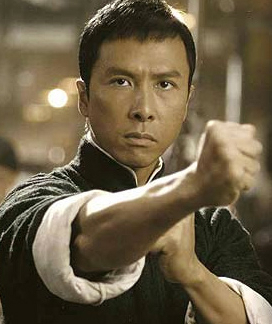 While Donnie Yen is only now getting noticed in America, he's been doing martial arts films since the early 1980s, starting out as a stuntman and working his way into a fight choreographer, lead actor, producer, and director. If there is a Rat Pack of Hong Kong action stars that includes Jackie Chan and Michelle Yeoh, Donnie Yen is a big part of it. He's currently the highest grossing Hong Kong action star and puts out between two and four movies a year. It was his one-two punch of the biopics Ip Man and Ip Man II (about the legendary Wing Tsung master Ip Man who taught Bruce Lee) that not only blew away fans and brought him high acclaim, but also brought him to America's attention.
While Donnie Yen is only now getting noticed in America, he's been doing martial arts films since the early 1980s, starting out as a stuntman and working his way into a fight choreographer, lead actor, producer, and director. If there is a Rat Pack of Hong Kong action stars that includes Jackie Chan and Michelle Yeoh, Donnie Yen is a big part of it. He's currently the highest grossing Hong Kong action star and puts out between two and four movies a year. It was his one-two punch of the biopics Ip Man and Ip Man II (about the legendary Wing Tsung master Ip Man who taught Bruce Lee) that not only blew away fans and brought him high acclaim, but also brought him to America's attention.
What makes him so good? Of course, he has great martial arts skills, and he practices Wing Tsung which has not been used as much as kung-fu or other forms in film. He's also a 6th degree black belt in Tae Kwon Do and proficient in numerous other forms. In fact, if not for a serious shoulder injury, he would probably be dominating the MMA circuit right now. He's also good-looking (important in film) and charming. But on top of that, he has acting chops. While the action in the Ip Man series is astonishing, there are plenty of dramatic aspects to the film as well. More than any other film star/martial artist, I see Donnie Yen attempting to do more than just kick butt. He brings a sense of soul to his characters that creates a strong impact.
As a writer, I've tried to use this with Malja, Owl, and all my characters in their fighting. It's not just about cool moves and big explosions. Whereas Jackie Chan infused humor with his stories, Donnie Yen shows how to throw a punch and still have a drama behind that fist. That's a key element to writing good action — making it about more than just a fight. It's true in film, too, but it's easier to get away with just the visual element in film. Obviously, this is not so in prose.
Think about it this way: which is more interesting — a man punching another man or a man forced to punch another man but not wanting to, in fact, knowing that if he does so, in some way, he could cause serious harm to his own soul. From theater to film to books to campfire stories — all storytellers know that it's far more exciting to watch somebody try (and usually fail) to not do something than just to simply do it. Donnie Yen brings that to his martial arts film work. I highly recommend checking it out.
March 20, 2012
Can we mix our Fantasy with our SF?
Categorizing books is a tricky business. And that last word — business — is the crucial one. See, book categories were not created by librarians with the purpose of simply putting every book in its proper place. Nope, booksellers are the ones who have traditionally decided what categories to offer. Publishers try to nudge things one way or the other, and Amazon has changed the rules a bit by letting publishers simply decide outright, but way back in my youth, the booksellers were the decision makers.
This is important to us in genre because it explains why all science fiction and fantasy once was simply called Science Fiction. Lord of the Rings? Science fiction. Dragonriders of Pern? Science fiction. You name it, that's what it was called. Why? Because riding out of the 40s and 50s, science fiction was the big seller. Technological advances were happening but the real exciting stuff was still in our imaginations. We contemplated things like going to the moon but couldn't quite get there yet.
By the 80s, however, Fantasy started kicking into high gear. It began to outsell science fiction enough that the booksellers split the two genres (I know the publishers had a hand in this, too, but I'm trying to keep this simplified). Because of the way traditional publishing is set up, the two genres ended up with a stiff divide between them. Those authors unfortunate enough to be inspired to write a genre-crossing novel? Well, most of them didn't get published.
But today, things are changing. Readers, while still enjoying the firmly entrenched SF or Fantasy story, are more willing to try stories that mix the two. And thank goodness. Not just because it allows me to write a series like The Malja Chronicles which is Fantasy (there's magic after all) but also has clear science fiction influences (apocalyptic themes, portals to other worlds, a technologically advanced past), but also because allowing writers to blend the two genres (or any genres, for that matter) takes off the shackles.
What attracts me most to Fantasy is the limitless possibilities. You can do anything. But during that period of the 80s to 90s or so, publishers and booksellers started putting on "rules" to what worked and what didn't. Medieval settings, dragons, detailed and consistent magic systems, etc, etc. It was all a crock but it made them feel like they had some way of controlling what would be a bestseller.
Now some "rules" are certainly good guidelines, especially for a novice writer. But the fact is that in Fantasy, if you can make it work, then you can do it. Doesn't matter if your magic system has no sense of rules about it. If you write well enough to have your readers buy into it, if you serve your story well, then it works. Think of all the fairy tales we grew up on. There isn't a huge magic system, but rather there is magic and maybe one rule given. And the rule exists only as a plot point (a magic mirror, only a kiss will break the spell, etc). That's the beauty of this genre. It's a big part of where the art exists. And, in the end, it's why I'm thrilled to see readers embrace the full scope of the genre once again.
March 13, 2012
Movies We Loved (Just Might Not Admit It): Quest for Fire
In the genre of historical fiction is the small sub-genre of caveman fiction. In print, we have Clan of the Cave Bear by Jean Auel and all its sequels. In film, we have numerous examples of horrible movies, including Caveman with Ringo Starr. But then in 1981, there came along this little gem called Quest for Fire – arguably, the only good caveman movie made to date.
The movie stars Ron Perlman, no stranger to heavy make-up type movies, and Rae Dawn Chong,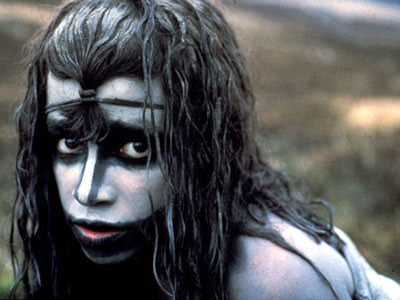 sister of Robbi Chong (TV actress for decades now) and Marcus Chong (Tank from The Matrix) — all children of Tommy Chong (of Cheech & Chong fame). The movie is spoken entirely in caveman-ish and that language was developed by Anthony Burgess (who wrote A Clockwork Orange). In other words, there were some big names associated with this attempt to make a realistic caveman movie.
sister of Robbi Chong (TV actress for decades now) and Marcus Chong (Tank from The Matrix) — all children of Tommy Chong (of Cheech & Chong fame). The movie is spoken entirely in caveman-ish and that language was developed by Anthony Burgess (who wrote A Clockwork Orange). In other words, there were some big names associated with this attempt to make a realistic caveman movie.
In many ways, it was a success. It made a lot of money and won a bunch of awards, including an Oscar for Best Makeup. In fact, almost all of the awards it received were in the makeup and sound editing departments. So, we know it looked and sounded really cool. And it still does, for the most part (the only super-schlocky thing are the mastodons, but hey, this was 1981. There was no CGI back then).
So why did I add this movie to this series of posts? Because, despite the admirable job the movie's creators did in putting together this work, despite my inner-geek loving this movie, it is still a caveman movie that doesn't quite deliver. Clearly it delivers better than any other caveman movie in existence, but that's not saying much. In fact, I'd argue that with the exception of Jean Auel's book, there really hasn't been much good in the way of caveman fiction.
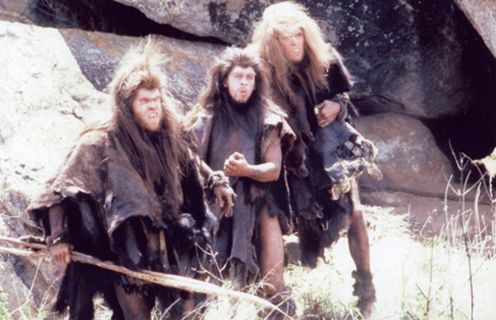 And yet, part of us yearns for just such a tale. I suspect it reaches in to the very same part of us that finds pleasure in post-apocalyptic tales — a look into our own world minus all the advances that make civilization civilized. In some ways, it's the closest we get to seeing our truest nature — the part of us that simply lives unbound by polite rules. Of course, we can't live this way in our real lives, so we turn to fiction.
And yet, part of us yearns for just such a tale. I suspect it reaches in to the very same part of us that finds pleasure in post-apocalyptic tales — a look into our own world minus all the advances that make civilization civilized. In some ways, it's the closest we get to seeing our truest nature — the part of us that simply lives unbound by polite rules. Of course, we can't live this way in our real lives, so we turn to fiction.
The problem many who attempt this brand of storytelling run into, I believe, is that there are two conflicting aspects to this unique story. On one hand, a caveman story is historical fiction. There is a limited record out there to be researched, digested, and utilized for creating an authentic story. This is no different than the work a writer puts in to creating a Civil War story or something taking place in the 1940s. Research, digest, utilize.
However, there is a competing aspect that I touched on above — the post-apocalyptic tale. Whether fantasy or science fiction, the post-apocalypse has provided writers and genre readers with endless hours of fun. And because there is a caveman-ish feel to a post-apocalyptic tale, many writers mistakenly reverse that concept — they make their caveman tale feel a bit post-apocalyptic. They add in fantasy elements like giant monsters to battle (sometimes dinosaurs, sometimes complete fictions) or magic shaman. Essentially, they approach the material as if an all-out caveman movie would be boring, so they have to jazz it up with SF and F elements.
That's the problem Quest for Fire attempted to correct. They succeeded on many levels, but as a whole, the movie just doesn't hold up. It certainly gave me hope back in the '80s that others would build off the baby steps this movie took, and for that I love this movie.
But I'm still waiting for a truly awesome caveman film.
March 4, 2012
Updates and Read an E-Book Week
Hi all! This week's post comes early because of a special sale going on that I don't want you to miss. More on that in a moment.
First, those of you who follow my facebook fan page know that I injured my knee last week. Still waiting to hear the end results (I see an orthopedist tomorrow) but I've been laid up and on crutches since then. Even had to cancel attending Stellarcon which really bummed me out. But I did get a lot of writing done and managed to set up a few things I've been meaning to do.
One of them is that I've now got a newsletter. It's a once-a-month (at the most) update on my books and stories, offers for advanced readings, beta-reading, contests, freebies, and plenty more. I also promise that you won't get any more than one e-mail a month maximum.
Lots of easy ways to sign up. You can click the link in the right-hand column. You can click HERE. And if you know how to use it, you can use this:

In other news, this week is Read an E-Book Week. Smashwords.com always supports this effort by getting as many of its books available at steep discounts. This year, I thought I'd participate as well. So, if you want to try out my books cheap, use the coupon code REW50 over at Smashwords. The individual short stories are not part of this offer because they're only $.99 to begin with.
The links below will get you right there:
The Way of the Black Beast – was $4.95 — This week only $2.48!
The Way of the Sword and Gun – was $4.95 — This week only $2.48!
10 Bits of My Brain – was $3.99 — This week only $1.50! That's 62% off!!
At Smashwords, you can get the e-book in just about any format you can think of, so no matter what kind of reader you've got, you should be good to go. This offer is good only this week. It ends on Saturday March 10th, so don't miss out!
February 28, 2012
How Usopp Made Fawbry Work
Hearing back from fans of The Malja Chronicles, one character keeps coming up as a favorite — Fawbry. He's a favorite of mine, too. He's the comic relief, for one, and though he is quite cowardly, he can summon upon a bit of courage when his friends are in desperate need. Many characters influenced the creation of Fawbry but no bigger than Usopp from the anime series One Piece.
 Those of you who have followed the blog should not be surprised that a Japanese cartoon had a major influence on The Malja Chronicles. Anime, in general, helped shape the structure of Book 1 (The Way of the Black Beast) by forming a team of individual archetypes that aided in propelling the classic hero journey plot along. Layering these two — classic western plot with eastern archetypes — was a huge challenge and part of the delight in writing the book. It provided many surprises along the way, one of which was Fawbry.
Those of you who have followed the blog should not be surprised that a Japanese cartoon had a major influence on The Malja Chronicles. Anime, in general, helped shape the structure of Book 1 (The Way of the Black Beast) by forming a team of individual archetypes that aided in propelling the classic hero journey plot along. Layering these two — classic western plot with eastern archetypes — was a huge challenge and part of the delight in writing the book. It provided many surprises along the way, one of which was Fawbry.
I like humor. In person, I'm constantly cracking jokes. Growing up, I found a role model in Hawkeye Pierce from M*A*S*H. Yet despite a life of silliness and laughter, my short stories and novels tend to be darker, bloodier, and serious. But I wanted some humor in Malja's world — especially because without any humor, that world would be way too bleak. Fawbry was my answer.
As a writer, I often create problems for myself that I've got to figure out how to solve. Many times these are plot issues, but in this case, I was challenging myself to figure out how to write a character that could be both funny and heroic, often switching from one to the other in a matter of sentences. Going in, I had no clue how to pull that off.
If I've been remotely successful, we have Usopp to thank. All the characters in One Piece (a comedic, action-adventure, pirate tale) can switch from silly to serious on a dime, but Usopp has the added layer of crying in fear for his life at one moment and jumping to save the day in the next. He may be terrified as he attacks a bad guy, and he may gladly run for his life in the next moment, but for that brief second of time, he is a hero. That was what I needed from Fawbry.
Characters have a way of surprising a writer, too. This happened when Fawbry finally got fed up with Malja (the scene in the horse stall) and verbally unleashes on her. He is angry and fearing for his life and he lashes out at her because there is nothing else he can do. The surprise comes in the form of love and caring. He doesn't know it quite yet, but at that moment, he revealed to me that he actually cares about Malja — not just as a tough lady who can save his hide and protect him, but as a person who can be trusted and who he wants to help. He's got a long road to go before he understands it, but that's the moment I knew it — which for Fawbry fans is important because that's the moment Fawbry's involvement in the series became far richer.
As I work on Book 3 — The Way of the Brother Gods, Fawbry's role keeps taking strange turns. I've tried to force him into one peg or another, but he cares too much for Malja and Tommy to let me make the plot go the way I want. He can be a coward, sure, but like Usopp, he'd hate for his friends to think he let them down.
Maybe that's why readers respond to him so well. Fawbry is more human than a hero. Let's face it — if we had to deal with half of what Malja goes through, we probably would be afraid, too. Fawbry allows us to experience that reality as well. And, hopefully, like any good comic relief, he does it with a touch of humor.
What kind of characters do you connect with?
February 21, 2012
The Blue Series — Muddy Waters
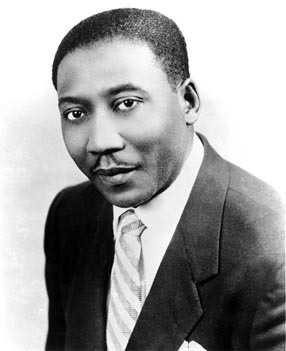 When it comes to the Blues, one of the most important figures is McKinley Morganfield, aka Muddy Waters.
When it comes to the Blues, one of the most important figures is McKinley Morganfield, aka Muddy Waters.
From The Official Muddy Waters website bio (which is lengthy but well worth reading) comes this:
The [Chicago] revolution began inauspiciously enough in 1948 with the release of a 78-rpm single by a singer-guitarist called Muddy Waters. Coupled on Aristocrat 1305 were a pair of traditional Mississippi Delta-styled pieces "I Cant Be Satisfied" and "I Feel Like Going Home," and on them Waters' dark, majestic singing. Waters' use of amplification gave his guitar playing a new, powerful, striking edge and sonority that introduced to traditional music a sound its listeners found very exciting, comfortably familiar yet strangely compelling and, above all, immensely powerful, urgent.
Here's the thing about Muddy. He brought electricity into the blues. He created the Chicago blues style which, in turn, has been a major influence on rock music. Though he played a simple style (as compared to the multi-layered finger-picking of Robert Johnson), he brought something new to it, and in doing so, created a fresh sound that just didn't exist before.
There's a song by Guns 'N' Roses called "Double Talkin' Jive" — stay with me, here. It's a fast, rocking piece. At the end, during an extended solo, the song fades out and is replaced by the exact same song, only this time, they are playing acoustic guitars. You realize quit quickly that the entire hard-rock song is really just a electrified version of a flamenco piece.
That's Muddy Waters.
He took old acoustic blues — Delta folk songs, really — stripped it down and electrified it. Sounds simple enough, but he made it work as something new.
As a writer, this a main part of my job. All the stories have been done before. Much of what I do is take what already exists and find some new nugget, new approach, new sliver of something about these stories that feels fresh and different.
The Malja Chronicles is, at its core, a post-apocalyptic survival story with magic. I've described it in the past as Xena meets Mad Max. The fact that we can describe our work in this way is proof that we're reworking older stories. So what makes it fresh? Well, the fact that magic (not oil) was the main energy source for the world before the Devastation has been intriguing readers, as well as the mixture of worlds that I've created. It's not a traditional medieval fantasy nor is it a classic SF apocalyptic tale. And nothing shows that better than my favorite assassins — the Bluesmen.
So, when you create anything — stories, music, paintings, anything — don't fret about being new and different. Think like Muddy. Strip it down, find something fresh in what's already there, and go forward.



